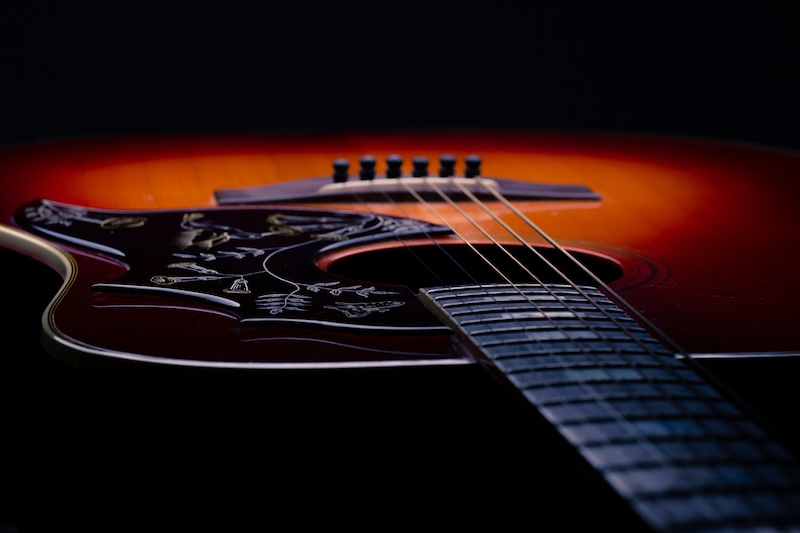Score Your Perfect Guitar: 10 Essential Tips for Buying Online or In-Store
Photo by Viktor Forgacs™️ on Unsplash
Budget Considerations:
When determining your budget for a new guitar, it’s essential to weigh your options carefully. Ordering online can sometimes offer better deals, including free shipping due to lower overhead costs for online retailers. Websites like Sweetwater and Musician’s Friend often have competitive prices and a wide selection of guitars across all price ranges.
However, buying in-store allows you to physically inspect and play the guitar before making a purchase, ensuring that you’re satisfied with the instrument’s quality and feel. Sales staff are usually available to answer any questions for you and can point out useful details about the guitar you may not have been aware of prior to visiting the store.
For budget-friendly options online, consider guitars like the Yamaha FG800 or Epiphone Les Paul Standard. If you’re shopping in-store, brands like Gibson and Martin offer higher-end models such as the Gibson Les Paul Standard and Martin D-28, providing exceptional craftsmanship and tone.

Playability and Feel:
Testing the playability of a guitar is crucial, as it directly affects your comfort and enjoyment while playing. When ordering online, you rely on customer reviews and specifications to gauge the guitar’s playability. Look for guitars with comfortable neck profiles and low action, which make fretting chords and notes easier. Brands like Fender and PRS are known for their guitars’ comfortable necks and smooth playability, with models like the Fender Stratocaster and PRS SE Custom 24 being popular choices.
Tonewood and Sound Quality:
The choice of tonewood significantly impacts a guitar’s sound, so it’s essential to consider this when making a purchase. Websites often provide detailed descriptions of the tonewoods used in each guitar model, allowing you to make an informed decision. Brands like Taylor and Martin use high-quality tonewoods such as Sitka spruce and mahogany, resulting in guitars with rich, balanced tones. Models like the Taylor 214ce and Martin D-28 exemplify the superb sound quality that these brands are known for.
Body Style Preference:
Your preferred body style plays a significant role in the comfort and sound of the guitar. Ordering online allows you to explore a vast array of body styles and sizes, from dreadnoughts to concert and grand auditorium shapes. Brands like Taylor offer a wide range of body styles, including the Taylor Grand Auditorium and Dreadnought models, catering to different playing preferences and tonal characteristics.
Pickup Systems for Acoustic-Electric Guitars:
If you’re considering an acoustic-electric guitar, the quality of the pickup system is essential for achieving a natural, amplified sound. Websites often provide detailed information about the pickup systems installed in each guitar model. Guitars like the Taylor 214ce come equipped with quality pickups, such as Taylor’s own Expression System 2, ensuring a clear and balanced amplified tone.
Hardware Quality and Reliability:
Examining the hardware components of a guitar is crucial for ensuring its durability and reliability. Look for guitars with reliable tuners, bridges, and other hardware components. Brands like Schecter and Ibanez are known for their guitars’ durable hardware, with models like the Schecter Hellraiser C-1 and Ibanez RG550 featuring high-quality components that ensure stable tuning and performance.
Brand Reputation and Customer Service:
Considering the reputation of the brand is essential, as it reflects the overall quality and customer satisfaction with their products. Ordering online allows you to research customer reviews and testimonials to gauge a brand’s reputation for quality and customer service. Established brands like Gibson and Taylor have earned a strong reputation over the years for producing high-quality instruments and providing excellent customer support.

Aesthetic Appeal:
The visual aesthetics of a guitar are also important considerations, as they contribute to your overall enjoyment and satisfaction with the instrument. Websites often provide detailed images and descriptions of the guitar’s finish and inlays, allowing you to assess its visual appeal. Brands like PRS are known for their guitars’ stunning finishes and intricate fretboard designs, with models like the PRS SE Custom 24 showcasing their exceptional craftsmanship and aesthetics.
Resale Value and Investment:
Considering the guitar’s potential resale value is wise, especially if you anticipate upgrading or selling it in the future. Models like the Martin D-28 and Gibson Les Paul Standard tend to hold their value well over time, making them sound investments for any guitarist.
In conclusion, both ordering online and buying in-store have their advantages and considerations when purchasing a new guitar. Online shopping offers convenience, a wide selection, and potentially better deals, while buying in-store allows you to physically inspect and play the guitar before making a purchase. With the recent announcement of Sam Ash closing their doors, your options for in-store are getting more limited by the day, unfortunately.
Regardless of your preferred method, researching and considering factors such as playability, tonewood, pickup systems, and brand reputation will help you find the perfect guitar for your needs and preferences.
Check out more great articles here!

